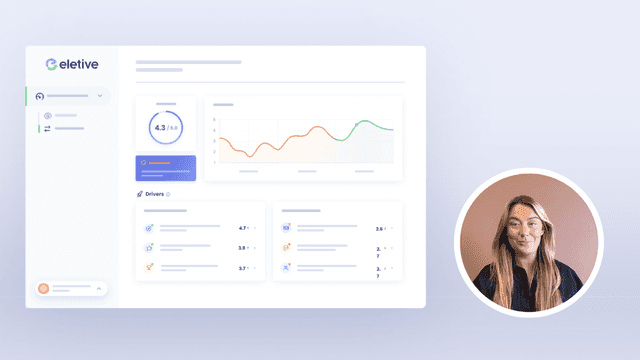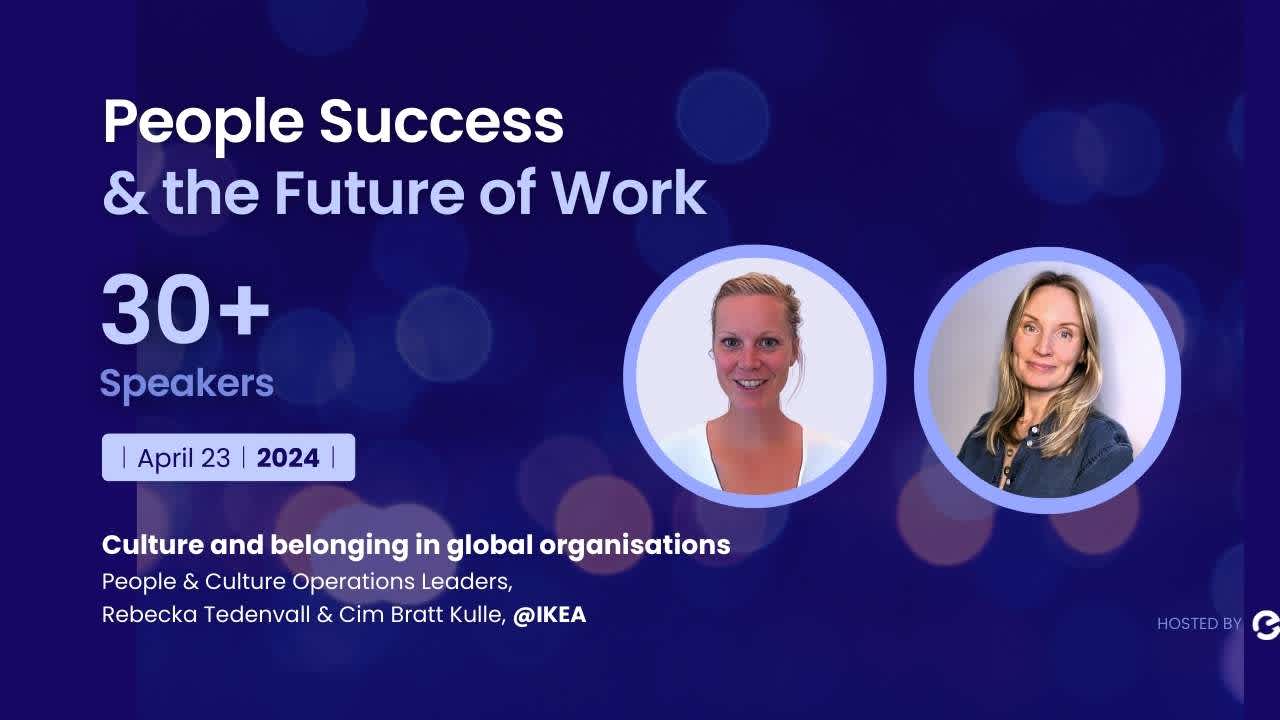In a compelling interview with IKEA, the significance of culture and belonging in global organisations was explored, providing valuable insights for HR managers in global organisations.
In this blog post, we delve into the insights gathered from the interview with IKEA at People Success & the Future of Work. Rebecka Tedenvall and Cim Bratt Kulle, esteemed Global HR leaders, engage with Nina Quist to articulate their strategies concerning culture and fostering a sense of belonging at a global organisation like IKEA.
Insights on global culture and belonging from IKEA
Creating a strong company culture is a top priority for HR managers worldwide. It’s the backbone that supports employee engagement, productivity, and retention. IKEA has mastered the art of cultivating a positive and inclusive workplace, but still with many learnings on the way. At People Success & the Future of Work, we had the pleasure of diving deep into IKEA's approach to culture and belonging through an insightful interview. Welcome to watch the interview below.
How IKEA works with culture on global level
Working with culture in a global organisation offers numerous valuable lessons that can enhance both personal and professional development. Here are some key learnings from such experiences:
The importance of IKEA’s vision
IKEA’s vision goes beyond selling furniture; it's about creating a better everyday life for many people. This vision is deeply embedded in their company culture, influencing everything from leadership decisions to daily interactions among employees.
Global Mindset
Thinking Beyond Borders:
Developing a global mindset that considers the broader implications of decisions and actions across different cultural contexts.
Collaborative Efforts:
Fostering a collaborative environment where knowledge and best practices are shared across borders.
Local Adaptation
Market-Specific Strategies:
Adapting business strategies to fit local markets, considering cultural preferences, legal requirements, and consumer behavior.
Local Leadership:
Empowering local leaders who understand the cultural context and can guide the organisation effectively within their region.
Creating belonging
During the interview, the importance of belonging was a recurring theme. IKEA believes that when employees feel they belong, they are more engaged and productive. This sense of belonging is cultivated through various initiatives, including:
Inclusive environment: IKEA promotes an inclusive environment where every employee feels valued and respected, regardless of their background.
Employee empowerment: Employees are empowered to voice their opinions and contribute to decision-making processes.
Diversity and inclusion programs: IKEA has robust diversity and inclusion programs that ensure equal opportunities for all employees.
Leadership and culture
Leadership plays a crucial role in shaping company culture. At IKEA, leaders are not just managers; they are mentors and coaches who inspire their teams. The interview highlighted several leadership practices that contribute to a positive culture:
Open communication: Leaders encourage open communication and transparency, fostering trust and collaboration.
Supportive leadership: Leaders provide support and resources to help employees grow both personally and professionally.
Recognition and appreciation: Regular recognition and appreciation of employees' efforts boost morale and reinforce a culture of gratitude.
Work-Life balance
IKEA understands the importance of work-life balance. They offer flexible working arrangements and prioritise employees' well-being. This approach not only enhances job satisfaction but also improves overall productivity.
Continuous learning and development
IKEA invests heavily in continuous learning and development. Employees have access to various training programs and development opportunities that help them advance in their careers. This commitment to growth fosters a culture of innovation and excellence.
Cultural Awareness and Sensitivity
Understanding Differences:
Recognising and appreciating the diverse cultural backgrounds of colleagues is crucial. This includes being aware of different communication styles, work ethics, and social norms.
Avoiding Stereotypes:
It's important to avoid generalising behaviors and attitudes based on cultural stereotypes. Instead, approach each individual as unique, with their own set of values and experiences.
Effective Communication
Language Barriers:
Overcoming language barriers through clear and simple language, using translators or language-learning tools, and being patient in conversations.
Non-verbal Communication:
Paying attention to non-verbal cues such as body language, gestures, and facial expressions, which can vary significantly between cultures.
Adaptability and Flexibility
Adjusting Management Styles:
Leaders may need to adapt their management style to fit the cultural expectations and practices of their team members.
Flexible Policies:
Developing flexible policies that can accommodate different cultural practices, such as holidays, dress codes, and work hours.
Conflict Resolution
Understanding Conflict Sources:
Recognising that cultural misunderstandings can be a significant source of conflict and addressing them promptly.
Mediation Skills:
Developing skills to mediate conflicts in a culturally sensitive manner, ensuring that all parties feel heard and respected.
Respect and Empathy
Building Trust:
Establishing trust through consistent, respectful, and empathetic interactions.
Empathy in Action:
Practicing empathy by putting oneself in others' shoes and understanding their perspectives and challenges.
Leveraging Technology
Communication Tools:
Utilising technology to bridge gaps, such as video conferencing, instant messaging, and collaborative platforms.
Cultural Intelligence Tools:
Leveraging tools and apps that provide insights into cultural norms and practices.
Applying IKEA’s starting points in your organisation
As an HR manager, you can draw inspiration from IKEA’s approach to culture and belonging to enhance your organisation’s culture. Here are some practical steps:
1. Define and communicate your vision
A clear and inspiring vision lays the foundation for a strong company culture. Ensure that your vision aligns with your organisational values and goals. Communicate this vision regularly to keep employees motivated and aligned.
2. Foster inclusivity and belonging
Create an environment where every employee feels they belong. Implement diversity and inclusion programs and encourage open dialogue about inclusivity. Recognise and celebrate the unique contributions of each team member.
3. Empower your employees
Empowering employees boosts engagement and productivity. Provide opportunities for employees to voice their opinions and involve them in decision-making processes. Trust your employees and give them the autonomy to excel in their roles.
4. Develop supportive leadership
Train your leaders to be mentors and coaches. Encourage them to practice open communication, provide support, and recognise employees' efforts. Strong leadership is essential for sustaining a positive company culture.
5. Prioritise Work-Life balance
Offer flexible working arrangements and prioritise employees' well-being. A healthy work-life balance leads to happier, more productive employees. Consider implementing wellness programs and providing resources for stress management.
6. Invest in continuous learning
Promote a culture of continuous learning by offering training programs and development opportunities. Encourage employees to pursue their professional goals and support their career growth.
Conclusion
Building a strong company culture is an ongoing process that requires commitment and effort. By learning from IKEA’s approach to culture and belonging, HR managers can create an environment where employees feel valued, engaged, and inspired.
Remember, a positive company culture not only attracts top talent but also drives long-term success. Start by defining your vision, fostering inclusivity, empowering your employees, developing supportive leadership, prioritising work-life balance, and investing in continuous learning.
For HR managers, these insights are invaluable in fostering a workplace environment that promotes engagement, productivity, and long-term success. Building a strong company culture is not a one-time effort but an ongoing process that requires dedication and strategic effort from all levels of the organisation.

























